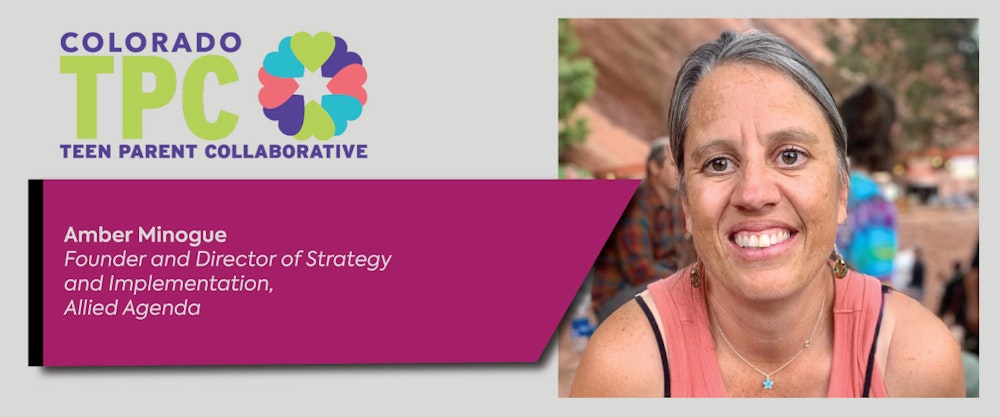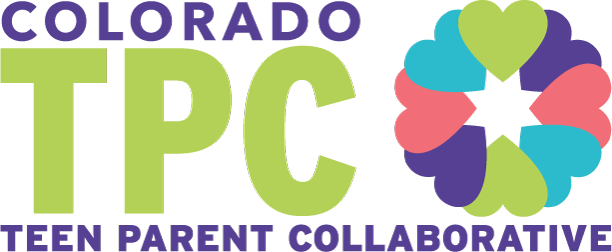
MAKING SURE TEEN MOMS, ESPECIALLY THOSE DEALING WITH SUBSTANCE USE DISORDER, HAVE THEIR VOICES HEARD AND THEIR UNIQUE NEEDS UNDERSTOOD.
The Teen Parent Collaborative brings together local non-profit and service providers throughout Colorado to ensure teen parents and their children have all the resources they need to flourish. It is a unified community of organizations working to make sure individuals, organizations, leaders and advocates have a place they can come to for trusted, research-based information to support providers working with teen parents.
Amber Minogue, one of two people who manage the Teen Parent Collaborative, explains that dealing with substance use for a teen mom is just another layer on top of an already complicated issue. “Their lives are often very complicated and they're forced to become adults when they don't necessarily have the resources or life experiences to know how to do that,” she said. “It’s hard to find mental health providers who have expertise that is specific to that adolescent brain and how that's different, and how does it look when that teen becomes a parent when they might still be developing themselves”
The stress teen moms are dealing with is what often leads them to substance use.
“I think it follows that substance use is a way that some young parents may try to manage all they are going through,” Amber explained. “And these teen parents are less like to access healthcare or might not even realize they can access help independently of their families, not to mention just navigating through the services system is a barrier.”
“When a mom is experiencing some sort of maternal behavioral health issue or a substance use issue, it is going to look different than it does in an adult,” Amber explained. “And although they are doing a good job, providers and many home visitors don’t know how the signs and symptoms of an issue look different for adolescent parents.”
Amber serves on the Maternal Mortality Review Committee (MMRC) and believes we need more expertise developed on how to promote and educate providers on supporting mothers who are teens and have issues with substance use. That includes helping providers know how to help moms get past their worries and fears about health care, and how to support the mom in getting help for herself.
One good example of reaching teen moms is the Colorado Adolescent Maternity Program (C.A.M.P.) program at University Hospital. They specialize in prenatal and birth care from certified nurse midwives who specialize in adolescent maternity care. They offer Medical Services (prenatal, pediatric and family medicine), Mental Health Services, Financial Counseling and WIC appointments on-site. Learn more about their services here.
Amber says the Teen Parent Collaborative has partnered with C. A. M. P. to have their social workers and counselors speak to their membership and educate them about their experience working with moms who use substances, what it means to be in the system, what it means to be a mandatory reporter, etc.
For these teen moms, so much stigma still exists, especially in medical care. So, even when moms do get the healthcare that they need, they get care that feels, for whatever reason, like they're not being served fairly.
The Teen Parent Collaborative is not just about bringing together people who work with and serve teen parents, it’s also about providing a voice who can advocate on behalf of the needs of teen parents. And it’s about providing opportunities for the people who are in the collaborative to see the situation through that teen parent lens. This helps them provide services that look different than serving older moms, taking into account the teen’s life experiences, and realizing what barriers are in place that are making it hard for that young mom to succeed.
The Teen Parent Collaborative provides professional development and education opportunities for those who work in this field and they are also advocates in the system to support teen parents better.
This past year, they lead a group of advocates with the passage of a bill that created a program to pay for driver's education and other costs associated with getting a driver's license because a teen mom that doesn’t have transportation is at a huge disadvantage. The effects of poor transportation are compounded even more when a young parent also needs to get their child to appointments. “It gets even harder for teens with no transportation when they have a child needing to get to appointments also,” Amber said. “And teen moms tell us the process and cost for just getting a permit was a barrier to them. A lot of young parents end up driving illegally, then get into trouble for that, and their problems are then compounded because they didn’t have the capacity or the resources to be able to get a driver's license.”
Childcare is another huge challenge for young moms. Our providers understand that if you can make it easier to access childcare, it will greatly increase the likelihood that the young parent will finish their education and/or get a job. Currently, programs at Florence Crittenton, New Legacy Charter high school, the Jefferson County Adolescent Pregnant and Parenting Program (JCAPPP), and Aurora Public School’s Young Parent Support Program are providing ancillary services and connecting young moms to things like the Colorado Child Assistance Program (CCAP), or meeting them where they are at as they use Family, Friend, and Neighbor Care (FFN).
The Teen Parent Collaborative has created a toolkit for providers.
It helps explain the types of things teen parents are dealing with including childcare, access to support services, rent, education, Title IX, and other important legal rights. The kit also includes an easy-to-understand infographic directed to the teen parent, so that a provider or support person can use it to help moms see a pathway to the things they need.
One of the most effective things providers can do right now to help teen moms dealing with substance use, is to tune into the Teen Parent Collaborative Webinar Series and sign up to attend quarterly (online or in-person) meetings.
The next quarterly meeting will be at the end of September and will focus on launching the driver's education program and explaining what implementation will look like, and how providers can help teen moms access this resource. These meetings also allow time to network, share ideas and workshop solutions.
When we talk about moms in recovery, we can't forget our youngest moms. As providers are seeing moms of all ages, we hope they’ll not only take advantage of the resources we provide but that if they have expertise in this area they will also share it and come forward to help us learn more.

To join the organization for the next quarterly meeting, please visit https://teenparentcollaborative.org
or email us at teenparentcollaborative@gmail.com.
The Teen Parent Collective also launched a 2022 Webinar Series.
“Navigating the New Normal: Tools For Managing Program Delivery & Working With Young Parents” was a professional development opportunity for people who work with and serve teen parents across Colorado. The series was a forum for practitioners, researchers, policymakers, advocates, and stakeholders working with pregnant and parenting teens to share expertise, network, and gain professional knowledge to improve practice and service delivery. Click here for more information on our next webinar series.
Other important resources:
If you are interested in Leadership opportunities on the Board of Teen Parent Collaborative, please contact Amber Minogue; amber@betheagenda.com
Share this article:






